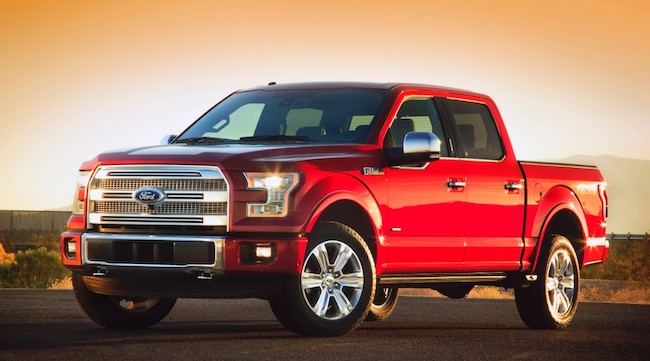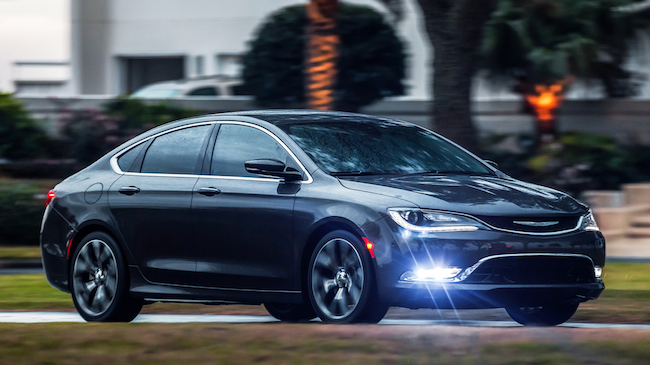Reflections from the Detroit and Chicago Auto Shows
- February 14, 2014
- BMW, Chevrolet, Chrysler, Ford, More Categories...
- Posted by George Peterson
- Comments Off on Reflections from the Detroit and Chicago Auto Shows
Has the 2014 Auto Show Season been a bust so far? Well, with the exception of the all new Ford F-150, there has not been much to justify all the fabricated hoopla at either the North American International Auto Show in Detroit or the Chicago Auto Show. You can almost count the significant new news on one hand. In order of importance to the United States market and their manufacturers here are the most significant: Ford F-150, Chrysler 200, Honda Fit, Hyundai Genesis, Mercedes C-Class in Detroit and the Subaru Legacy in Chicago. OK, that is six significant entries. Others that might have made the list are the GMC Canyon mid-size pickup and the Lexus RC-F coupe. The Detroit Show ended up focusing on performance models or concepts like the production-ready Subaru WRX STI, Toyota FT-1 super car, Chevrolet Corvette ZO6 variant, BMW M3 sedan and M4 coupe, Cadillac ATS coupe. The only other vehicles of note at the Chicago Show were the 2015 Lincoln Navigator with new front and rear styling and the Mercedes GLA compact crossover SUV.
2015 Ford F-150: Ford sold over 700,000 F-Series in 2013 and about 500,000 of these were F-150s. With the upcoming F-150, the body becomes aluminum saving about 700 lbs and allowing the F-150 to achieve substantially better fuel economy than it does now. Using the term “military grade” aluminum, the structure, hood, doors, pickup box, pickup box bed, tailgate – basically everything above the frame becomes aluminum. The frame remains steel and steel alloys and is still boxed for additional strength. The styling is strong, but evolutionary from previous F-Series and the interior, while well done, probably does not match the quality of the upper models of the Chevrolet Silverado and the Dodge Ram.
The Economics of Ford’s Aluminum Move: Ford spends heavily to keep its F-150 ahead of the pack and this renewal proves they are continuing that strategy. The aluminum body will be substantially more expensive than the steel body it replaces, but Ford cannot afford to significantly increase the price of the vehicle. This will be the highest volume automotive application of an aluminum body ever so Ford will achieve volume efficiencies that keeps costs down. Profits for the present F-150 are very healthy and the aluminum body will take a piece out of it, but the investment in this material for the future likely is very worth it. Also on the cost side of the equation is the downtime required to convert Ford’s two F-Series plants to the new body construction. The flagship plant at the Rouge in Dearborn will be down for eleven weeks for the conversion. The Kansas City plant will be down for two weeks at the beginning of 2015. While Dearborn is down, you can bet Kansas City will be pumping out F-150 on overtime to keep the pipeline filled. So, for the end of 2014, expect to see both 2014 and 2015 F-150s on Ford dealers’ lots.
The Dynamics of Ford’s Aluminum Move: One of the primary benefits from reducing the weight of the F-150 so greatly in addition to improved fuel economy is the improved driving feel of the vehicle. We expect the F-Series to be much more nimble and fun to drive with the 2015 truck. The powertrain lineup will have a 3.5L V6 as base with the next step up being a 5.0L V8 or 2.7L EcoBoost V6. The top engine continues to be the 3.5L Ecoboost V6 that tops the F-150 now.
Other Implications of the F-150 Shift to Aluminum: Buy Alcoa stock. Alcoa (AA) will have to add capacity to handle the big requirement for aluminum from Ford and this will be a huge boost to aluminum usage in the USA. Dealers will have to purchase new tools and equipment for their body repair facilities. Bodyshop workers will have to learn new techniques to repair the aluminum body panels.
Prognosis: Solid hit. Maybe a homerun.
2015 Chrysler 200: The Chrysler is derived from the same Alfa platform that underpins the Dodge Dart and the Jeep Cherokee. The 200 is presently a fleet car feeding Hertz, Avis, National with mid-size sedans waiting for travelers at airports around the country. While the 200 has pretty good sales volumes, less than half are to the retail market – to humans. Chrysler simply is not considered by mid-size car buyers. In AutoPacific’s New Vehicle Satisfaction Survey, only 16% of the participants will consider a mid-size car from Chrysler. This is twentieth down the list dominated by Ford, Toyota, Honda, Chevrolet and Nissan. In 15th place, we find the 200’s stablemate – the Dodge Dart at 19%. So, Chrysler products are not really on the consideration list of retail car buyers today.
The 200 shown at Detroit is a pretty good looking car that sacrifices interior roominess for style. The downward slope of the roof cuts through the forehead of a medium tall rear seat passenger. In a mid-size car, rear seat roominess, including headroom, is very important as is trunk room. Of course, the Chevrolet Malibu and hot-selling Ford Fusion are guilty of the same fault.
Prognosis: A challenge to position and market for much needed retail sales.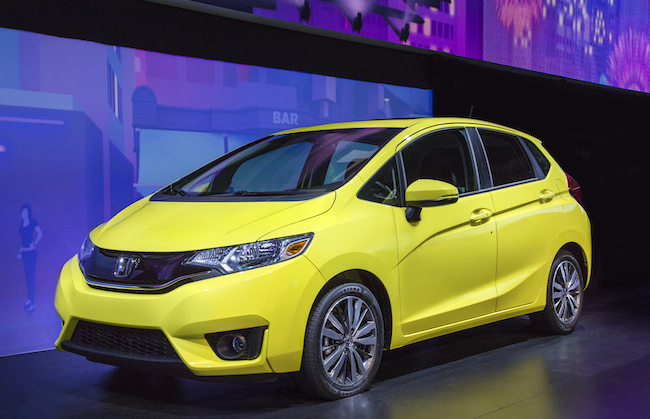
2015 Honda Fit: The Honda Fit evolves nicely from the present car. The size, package and style are very similar. At-a-glance it is still a Fit. Now being built in Mexico, the cars on display had horrendous build quality. The fit and finish was reminiscent of Korean products in their early days. Remember the 1986 Hyundai Excel? Yikes. Honda management says that these were very early sample cars and are certainly not production intent. They contend the cars that will eventually get into customers’ hands will be up to Honda’s accustomed quality and fit and finish.
Prognosis: If Honda’s Mexican Plant gets its quality act together and the cars have the same high quality as the Japanese-made Fits, this Fit will become a successful anchor to the Honda line-up in the USA.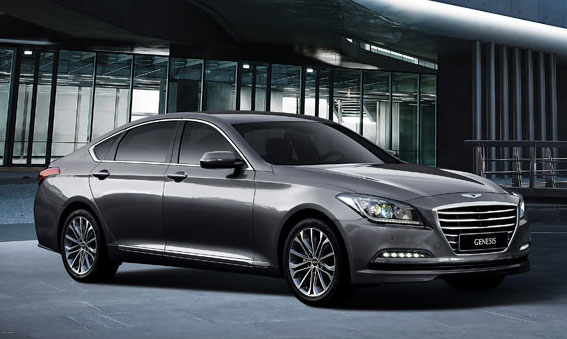
2015 Hyundai Genesis: It’s hard to believe that it is already time for the first major update to Hyundai’s Genesis. The new car takes cues from the Genesis show car shown last year, but considerably tones them down. Still, using “Fluidic Sculpture 2.0” styling, the car is crisper than before with a much more distinctive front end. Like almost all new cars and trucks, Genesis adds the LED accents to its headlamp surrounds. Bowing to what Hyundai dealers are doing anyway, Hyundai has added the “Bentley” wings from the Korean Home Market cars with the exception of the decklid where the flying “H” still resides.
Genesis adds an optional HTRAC all wheel drive system. Power remains the 311HP 3.8L V6 as base with the TAU V8 providing 420HP from 5.0 liters. An 8-speed automatic transmission is standard with all powertrains. The new Genesis is available with today’s suite of safety, comfort and convenience features including a 9.2-inch display with the premium navigation system.
Prognosis: Hit. A good follow-on to the excellent first attempt by Hyundai to crack the luxury car category.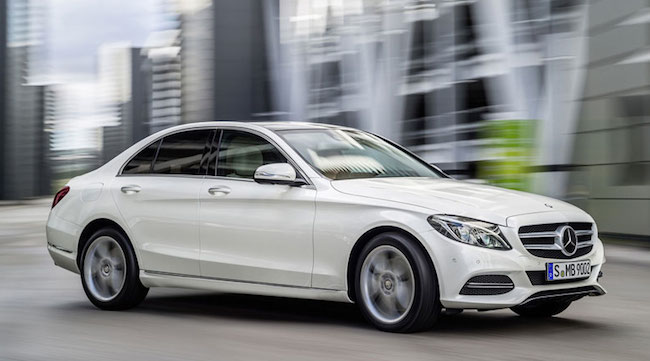
2015 Mercedes-Benz C-Class: With the new Mercedes CLA anchoring the Mercedes-Benz lineup in the USA, the C-Class has room to move up and it does. For 2015 the C-Class adopts Mercedes’ new styling cues with more expressive bodyside contours and more aggressive front fascia. The car is larger, riding on a three-inch longer wheelbase. The interior size is larger as well with upgraded materials. While the CLA is getting a lot of attention for being the most affordable Mercedes, the upgrade to the C-Class will broaden its appeal. If the price hike accompanying the new car is not too stiff, it should remain a solid seller for the marque.
Prognosis: Hit. Much more stylish than before with improved interior package and equipment.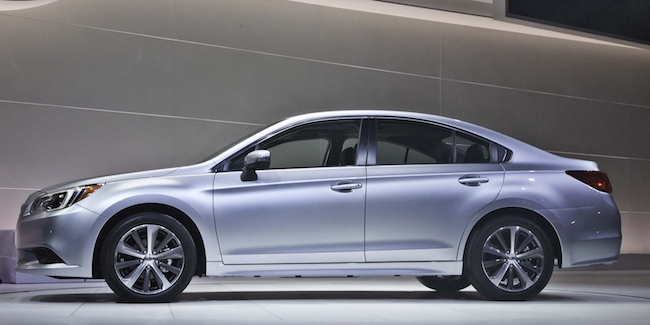
2015 Subaru Legacy: The most significant introduction at the Chicago Auto Show was the Subaru Legacy. With Subaru on a roll, the Legacy needs to stay fresh and the new car moves Subaru into a more distinctive styling arena than before. Legacy, however, will remain a lower volume competitor facing the likes of Camry, Accord, Fusion, Altima, Sonata and Optima. The primary chore of Legacy is to provide the platform for the Subaru Outback crossover that has been a smash success since it was introduced in 1994. Think of the Outback as a lifted, slightly butcher version of the Legacy.
The 2015 Legacy has a faster windshield and backlite angle than previously giving the car a much sportier look. Subaru claims that the Legacy has the largest interior in the mid-size car segment. Still with all-wheel-drive standard and powered by a base 4-cylinder Boxer engine (with a 6-cylinder Boxer optional) mated to a continuously variable transmission, the Legacy achieves 36mpg – highest among AWD vehicles.
Prognosis: Hit. A solid update for Subaru’s mid-size sedan.
